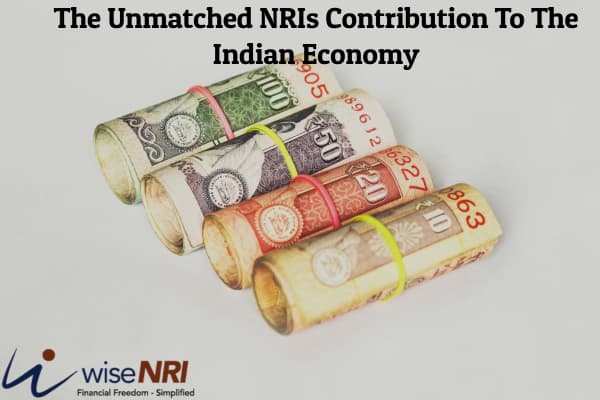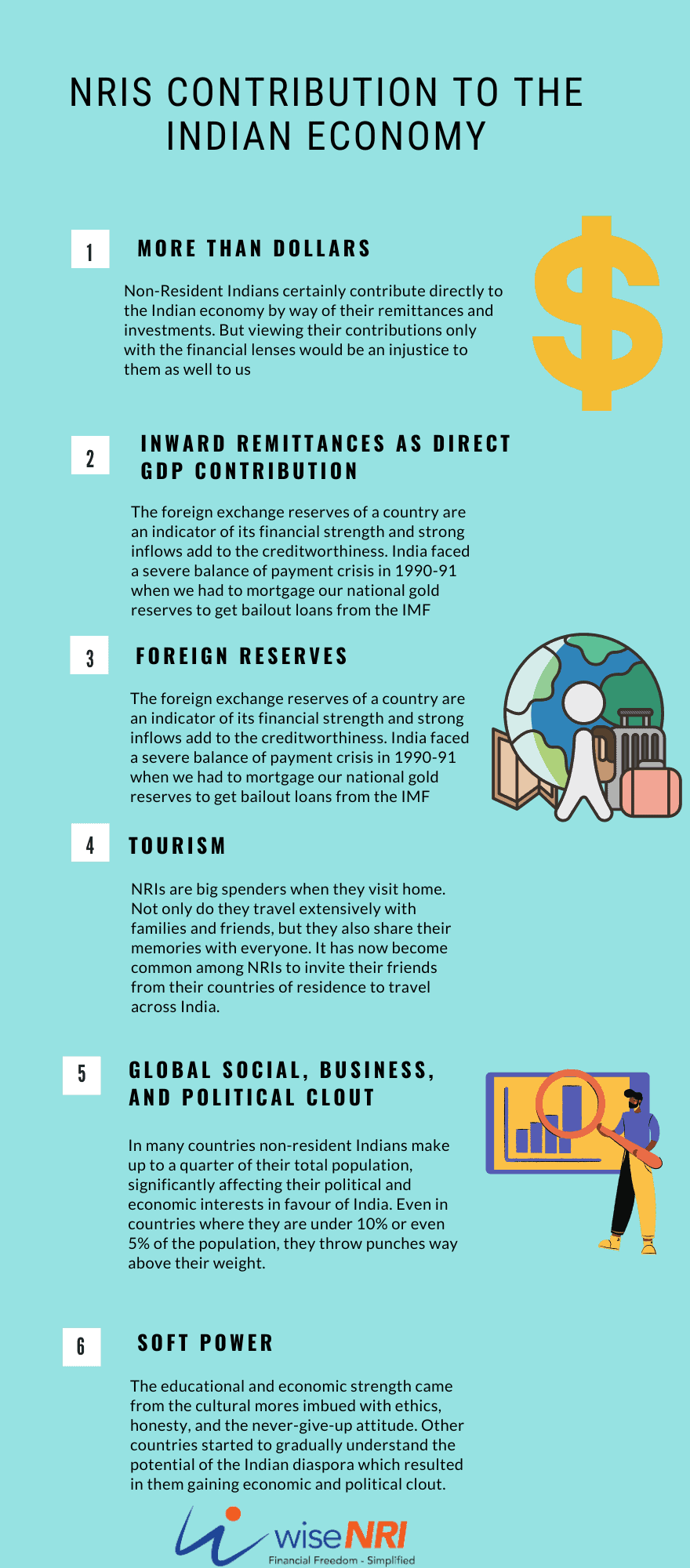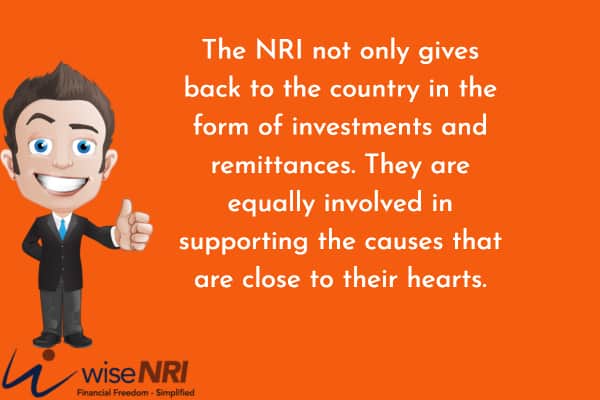Indians have been going to the farthest corners of the world since time immemorial. Even before the advent of steam engine-driven ships, Indians were trading with Middle East Asia, Africa, Southeast Asia, Central Asia, and Europe. The industrial revolution hastened the movement and immigration manifold. The latest leg of the immigration story, which started after the independence, is still being written.
As per the United Nations, of the 272 million global immigrants, Persons of Indian Origin (PIOs) make up close to 6.5%. Over time, the role of global Indians in their local economies, in the world economy, and their contributions to the Indian society and economy have only increased.

Must Read – NRIs Plan To Increase Investments In India
The Unmatched NRIs Contribution To The Indian Economy
Globalization in the 1970s and 1980s, and the liberalization of the Indian economy in 1991 resulted in more Indians going abroad to study, work, travel, and explore. Many of them stayed back and created “Little Indias” where they lived. While those who came back brought with them world-class practices, knowledge, technology, and access.
The ones who still reside overseas have strong and deep familial, cultural, and financial ties with India. These ties push them to do more for India and make them an asset that we cannot possibly value enough.
Therefore, it is high time that we recognize NRIs contributions to the Indian economy, society, polity, global soft power, and cultural & moral authority.
More than Dollars
Non-Resident Indians certainly contribute directly to the Indian economy by way of their remittances and investments. But viewing their contributions only with the financial lenses would be an injustice to them as well to us. Their non-monetary contributions have far greater and far-reaching benefits compared to their direct remittances.

Must Check – Outward Remittance
Inward Remittances as Direct GDP Contribution
The total immigrant population of PIOs is close to 18 million as per the UN report International Migration 2020 Highlights. This is by far the largest block of immigrants from any one country. The NRI population, at 13.5 million, is merely 1% of the total 1.35 billion population of India. Still, their direct contribution to the Indian GDP was an impressive 3.4% in 2017.
According to the UN report, India has remained the top country to receive the largest sum of remittances for almost a decade. In 2019 alone they amounted to USD 83 billion.
The huge flow of remittances goes on to fund many things:
- Managing day-to-day expenses.
- Buying consumer durables (like appliances) and fixed assets (tractors and cars).
- Building or buying property.
- Investing in equity, MFs, deposits, PPF, and bonds.
Foreign Reserves
The foreign exchange reserves of a country are an indicator of its financial strength and strong inflows add to the creditworthiness. India faced a severe balance of payment crisis in 1990-91 when we had to mortgage our national gold reserves to get bailout loans from the IMF.
One of the most reliable sources of foreign exchange inflows is the remittances from the diaspora. Every dollar (or Euro or Dinar) transferred by NRIs adds to India’s creditworthiness and foreign reserves. They make up nearly 25% of India’s total foreign reserves!
Tourism
NRIs are big spenders when they visit home. Not only do they travel extensively with families and friends, but they also share their memories with everyone. It has now become common among NRIs to invite their friends from their countries of residence to travel across India.
The culture of inviting foreigners to their weddings, family functions, and religious ceremonies is gaining popularity. Now many places in India are among the top choices for celebrity and destination weddings. This gives a great boost to the travel and tourism economy, the wedding market, and adds to our foreign reserves.
Must Read – 6 Best Places To Retire In India – For NRIs
Global Social, Business, and Political Clout
In many countries non-resident Indians make up to a quarter of their total population, significantly affecting their political and economic interests in favour of India. Even in countries where they are under 10% or even 5% of the population, they throw punches way above their weight.
For example, PIOs form only around 3% of the Canadian population but in the Canadian parliament’s House of Commons, 22 members are of Indian origin out of 338, making up 6.5% of the total. More so, 3 PIOs are senior ministers in the incumbent government including the Minister of defense.
Similarly, in the UK, there are 15 MPs in the House of Commons in the British Parliament. Rishi Sunak, the current Chancellor of the Exchequer (Finance Minister), is also pipped to be the next Prime Minister of Britain if the current PM Boris Johnson steps down or Tory’s return in 2024.

Check – How can NRIs impact Social development in India
The United States of America also has its first-ever Asian American, Indian-origin, Female Vice President in Kamala Harris. Along with her, 55 Indian-Americans are appointed to key positions by the Joe Biden administration.
Indians are currently heading titanic multinationals – Indra Nooyi (PepsiCo), Satya Nadella (Microsoft), Sundar Pichai (Alphabet), Parag Agarwal (Twitter), Leena Nair (Chanel), Shantanu Narayen (Adobe), Arvind Krishna (IBM), and Jayshree Ullal (Arista Networks). The list is limitless!
Must Check – NRI Checklist
Soft Power
The educational and economic strength came from the cultural mores imbued with ethics, honesty, and the never-give-up attitude. Other countries started to gradually understand the potential of the Indian diaspora which resulted in them gaining economic and political clout.
Throughout history, one thing never changed – the Indian soft power. The cultural diversity, religious pluralism, racial & ethnic coexistence, and spiritual superiority of India have always fascinated the world. But with NRIs celebrating Indian festivals, with gusto in their localities, more people now are enchanted by the soft power.
People from the world over now enjoy Bollywood and other Indian songs and dances. Indian food is now considered one of the richest cuisines served at Michelin star restaurants. More people today embrace Ayurveda, Yoga, and Indian Spirituality learnings than ever.
Giving Back
The NRI not only gives back to the country in the form of investments and remittances. They are equally involved in supporting the causes that are close to their hearts. This support comes in many forms – charities, trusts, donations, direct actions, policy changes, and financial interventions.
For example, the Dakshana Foundation established by Mohnish Pabrai is focused on alleviating poverty by investing in education for the meritorious students from the financially weaker sections. They model their residential schools on the lines of Super 30 of the celebrated educator Anand Kumar.
Many NRIs have helped their country in times of crises – whether it was the wars and conflicts, US-India nuclear deal, or humanitarian crises. The most recent example is of thousands of NRIs mobilizing millions of USD in aid during the ravaging second wave by way of Oxygen tanks, concentrators, and medicines.
Thank You, NRIs
Indian Prime Minister Narendra Modi went on to say, “World’s keenness to engage with India has risen. Our diaspora can play a vital role in furthering India’s engagement with the world”. All Indian governments have recognized and offered more tangible benefits to the NRIs as a token of gratitude.
NRI have, are, and will always be the sons and daughters of the homeland. They may have to leave India for many reasons, but they make sure that India never leaves their hearts. And they show their love for their country not by paying lip service, but in concrete and material ways that matter.
As the new wave of technologies and global realities sweep over the world, we are sure that with the increasing clout of Indians – here and abroad – India will emerge on top of the world order. We cannot thank our NRIs enough for their Contribution to The Indian Economy.

If i move india what will happen to my NRI status Is there any RNOR status What is this
I am resident of Dubai since 1980. Now retired, want to move back to India. What happens to my investments and income abroad. Will the be taxable in India qnd what will be implactions
Dear Hemant,
I lost my father when I was only 14 years old. He had stomach Cancer. He sold a land to educate his first born who wanted to be an Architect. My elder brother who was is in a hostel came to his funeral and found out that there was “No pot of gold” for him so he told our mother who was only 39 years old – ” Poverty is a curse” and he had no responsibility towards other siblings and left us in the cold. I had to take a “Succession Certificate” for my mother and 4 brothers as my father didn’t make any Will in his lifetime. He only had a meagre Life insurance worth Rs. 4000/- it was meant for my elder sister’s dowry. I became defacto head of the Family and I went to my close relatives for advise how to survive and put food on the table. My mother’s older brother was a Chief Medical Officer in a Municipal Hospital & patients
who were rich so he was affluent. He told me to sweep floors in my father’s business premises subduing myself to his partner and write ledgers which my father was doing all his working life. When he passed his Master’s Degree from Calcutta University in 1927, he was offered a job as Asstt. manager in Imperial Bank but he refused to wear suits as he was a Bengali in ‘heart & soul’
I had to recover my father’s business from his partner ( that is a
complicated story) and ran the Building Materials business with the other servants who were very loyal & trustworthy. I managed to study and collected the “sales book” after school and entered
them in the ledgers and hen did my home work. Next morning left the sales book in the office then went to my school. Through hard work I finished my B.Sc Degree and secured a passport and went to British Consulate looking for “Job Voucher” so that I can become an Economic Migrant. I was lucky to pass “viva voce” and got my Visa. I left India in August 1962 and became a
NRI within 4 years after working in Schools as a Lab.Technician.
I sent money home within a month as I worked temporarily in a “Burger Joint” called “Wimpy” before “McDonald or Burger King”.
In my absence, my two younger brothers sold all our properties with an excuse they couldn’t collect the rental income so they sold them all with the help of my Brother-in-law whom I trusted with a Power of Attorney just in case of hardship in our family.
I was heart broken as I was sending my regularly, half starving
working whole day and attending “night school” to study other subjects to enhance my chances to get better job experiences.
My luck changed and I found a job in “New Scientist” and got a job in the Scientific Civil Service and promotion in 15 months.
My brothers leased two floors ( 6421 Sft.) State Bank of India @ 35 paisa per Sq.ft in Feb.1973 without doing market research !
I bought my house in Harrow in Nov.1973 for only £12000/- where Neheru went to The public School) there and raised a family. But still sent money home to my widowed mother until she passed away in 1985. I may be a NRI but a Bengali in heart & soul but when consulted a High Court Advocate in Kolkata, he advised me not waste my money against my brothers in Court as it is now the norm. In a civil case it could take 10 years. So
I had to appeal to the Chairman so that I get my share of rents.
Kind regards,
Suprakash